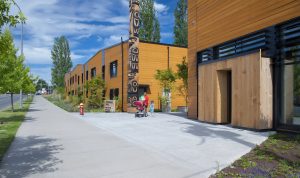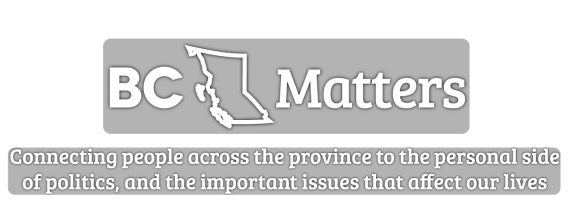
On Bowen Road in Nanaimo, there’s a building complex that doesn’t look quite like anything else around it: Nuutsumuut Lelum, a new joint housing project from the Nanaimo Aboriginal Centre and BC Housing, is cedar-sided and built to an internationally recognized ultra-efficient energy use standard called “Passive House”. It’s a new home to 25 Indigenous families.
And it’s beautiful.

At Nuutsumuut Lelum, I met Sandra, a resident bursting with excitement about her new home. Previously, Sandra had difficulty keeping her family together due to the inadequate, unhealthy housing she had found herself in. Now, she said, she was living in the nicest place she’d ever lived, with multiple generations of her family back together under one roof.
Stories like Sandra’s reinforce how making our buildings and communities more environmentally friendly can do so much more than reducing our carbon emissions. This idea—that the transition to a low-carbon economy can also help improve our quality of life—is at the heart of CleanBC, our government’s new climate plan.
Through CleanBC, we’re making a big push on energy efficient buildings, upgrading the BC building code, and providing incentives for owners and the construction industry to build and renovate to higher-efficiency buildings like Nuutsumuut Lelum.
By 2032, all new buildings in BC will be required to be built to the new ‘net-zero energy ready’ BC Energy Step Code— a high standard similar to “Passive House”. We’re also working to make BC’s public housing more energy efficient. For renters, this will mean a larger stock of healthier, high-efficiency housing.
We know that, for many families across the province, big one-time investments for things like furnace and window upgrades are too expensive, though they would improve their monthly bottom lines in the energy savings that come from them.
Efficiency incentives and rebates are a win-win-win—healthier homes, savings on bills, and the reductions in personal carbon emissions that benefit us all. I know that to achieve our climate goals as a government, we need to do everything we can to ensure that environmentally friendly choices are made as accessible as possible, to as many people as possible. The economy of the future needs to be one that works for everyone.
That’s why we’re focused on ways to make climate action more affordable. Under EfficiencyBC’s Better Homes program, our new provincial efficiency incentives for private residences, folks renovating their homes can get rebates, like up to $3,000 for replacing their heating system with an electric heat pump (which can use as little as one-third of the energy of electric baseboards or a gas furnace). There are up to $5,500 in rebates available for upgrading insulation, and up to $2,000 for replacing older, draftier windows and doors with better-insulated ones.
We’re also offering rebates on zero-emission vehicles (ZEVs). We’ve taken the bold step of mandating that all light-duty vehicles sold in BC by 2040 be ZEVs, and we hope this will be the push the industry needs to make ZEVs more available and therefore, less expensive. In the meantime, our provincial EV rebates will make electric vehicles accessible for more British Columbians.
Transforming buildings, transportation, and infrastructure also depend on having workers equipped with the right skills. Through CleanBC, we’re supporting the expansion of clean jobs in BC, including jobs in electric vehicles, energy-efficient building construction, and our vibrant and growing cleantech sector.
The former BC Liberal government failed to transition to a clean economy and failed to build an economy that works for everyone. The Liberals set us back by over a decade in preparing for our low-carbon future in a responsible way.
Our government understands, however, the imperative to move to a clean economy in a way that prioritizes working people. We can and must lift workers up as a part of this transition.
Our province can’t afford to pass up the opportunities presented by the clean economy. I am so proud that we are working toward our climate goals in ways that will leave all British Columbians better off in terms of health, wealth, and community.
Nuutsumuut in #Nanaimo, a 25-unit affordable housing project by @BC_Housing & @NanAborgnalCntr won a @chbavi award for it's energy efficient design. This project showcases how transitioning to a low-carbon economy also improves quality of life. 🏠🍃 #cleanbc #bcpoli pic.twitter.com/JMxZqlWzWY
— Sheila Malcolmson (@s_malcolmson) May 14, 2019

